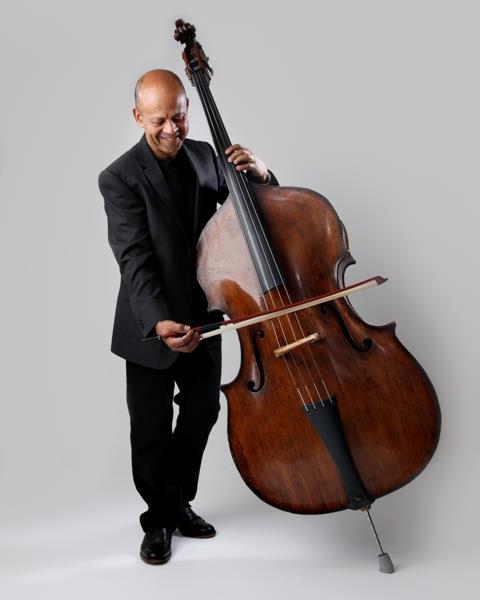The musician was forced to listen to his body to prevent the recurrence of back and finger issues

Would you describe yourself as a healthy person?Absolutely! For most of my life I have regarded myself as indestructible, perhaps because I play the bass for ten to twelve hours a day – a formidable but hugely enjoyable physical challenge. Most of the problems I have faced have not been caused by playing the bass, but by the stress of carrying it around. When you are young strains and injuries heal quickly, but when you are older the body takes more time to heal, particularly when as a freelance musician you don’t have the luxury of taking time off to recover.
What particular problems have you faced?
The recurring problem is with my back. A frightening number of bass players have bad backs, mainly because we have to carry our instruments over long distances during the course of our work. Few venues in the UK have unloading or parking facilities for bass players, nor do they provide bass stools, so we have to park far away and carry our bass, stool and bags to the hall. On tour, we have to struggle with flight cases weighing 45kg as well as our own luggage.
The first time I had an acute back spasm was the day after a concert in St Martin-in-the-Fields in London. I had parked my car at the opposite corner of Trafalgar Square and had just 20 minutes to get over to the church. I rushed across the square with my bass and the next day I couldn’t move. At times like that the pain is so intense that death seems a good solution. My doctor recommended hot and cold compresses, and once the spasm had resolved itself, he sent me to see an NHS physiotherapist who was incredible, but the course of treatment came to an end all too soon.
Have you found any exercises or alternative treatments that help your back?
I have a set of physiotherapy exercises for the lower back – mostly stretches and mobilisations – and when I feel my back is vulnerable, I work through them. Now, I also take much more care in how I do things physically. I have bought a wheel which fits into the bass endpin and I use it to move the bass around whenever possible. It’s not a perfect solution but it takes some of the weight away. Putting the bass into the boot of a car or the luggage compartment of a coach takes special care. I was a little late setting off from home recently and threw the bass into the car thoughtlessly. I felt some discomfort in the back so I went straight back inside and lay down on the floor for half an hour until the danger had passed. I also find it helpful to stand when I play, because sitting on a stool immobilises part of the back and stops you making natural adjustments to your posture.
Have you always listened carefully to your body?
Unfortunately not! That feeling of youthful indestructibility has always encouraged me to fight my way through physical discomfort – which is not always the best solution. Last August I took a few days off work to prepare for a recording session. I started practising at 8am one morning and as the day wore on I began to feel a little discomfort in my left forefinger, but I persevered and finally went to bed well after midnight. When I woke up the next morning the tip of my left forefinger was too painful to touch. A blister had formed deep under the callous and I knew I wouldn’t be able to touch the bass for days, let alone do the recording the following week. I was devastated; if ever a man was allowed to cry, it was then.
My doctor suggested the problem was persistent inflammation caused by over-use and prescribed a topical corticosteroid ointment to control the inflammation. Nine months later, the tenderness has disappeared but you can still see the blister, so I have been referred to see a hand and general plastic surgeon as there is a very small possibility that the blister is in fact a cyst. My temporary solution is to swathe my hardest working fingers in microporous tape whenever I’m playing for long periods, to protect the fingers from excessive friction with the strings. But my advice to anyone who is thinking of practising for too long is: don’t. If this proves unavoidable, stop as soon as you feel any discomfort whatsoever.
Do you follow a special exercise regime to stay fit?
I do walk a lot in the countryside around my home but I’ve always regarded playing the bass as my daily workout and have never followed a structured system of exercise. Unless exercise enables you to achieve something in particular, it has the danger of becoming an end in itself. I don’t believe in exercise for its own sake!
For me, mental exercise is just as important as physical. I read voraciously and when I practise, I stop every 20 minutes and walk to the bottom of the garden and think about what I am doing; it is often then that solutions come. Everything I do, physically and mentally, is in preparation for performance, so I can play with utter abandon and do whatever the moment demands. But there’s only so much the body can take and I’ve had to learn to respect its limits.
This article was first published in The Strad's May 2009 issue. Subscribe to The Strad or download our digital edition as part of a 30-day free trial. To purchase single issues click here.








































No comments yet